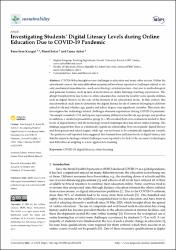Investigating students' digital literacy levels during online education due to COVID-19 pandemic
Abstract
COVID-19 has brought serious challenges to education and many other sectors. Within the educational context, the main difficulties experienced have been reported as challenges related to not only mechanical impediments-such as technology or infrastructure-but also to methodological and personal features, such as lack of motivation or online learning/teaching experiences. The abrupt transition from face-to-face to online education has created the need for some specific abilities, such as digital literacy on the side of the learners at all educational levels. In this context, this mixed-method study aims to determine the digital literacy levels of learners belonging to different school levels and whether age, gender and school degree were significant variables. This study also investigates the technology-related challenges students experienced during COVID-19 pandemic. The sample consisted of 510 participants representing different school levels, age groups, and genders; in addition, a smaller representative group (n = 30) revealed their own evaluations related to their levels of digital literacy and the technology-related challenges they had about online learning. The findings suggest that there is a statistically significant relationship between students' digital literacy and their gender and school degree, while age was not found to be a statistically significant variable. The qualitative self-reported data suggested that learners have sufficient levels of digital literacy, and that the major technology-related challenges were reported to be lack of the necessary technologies and difficulties in adapting to a new approach to learning.


















